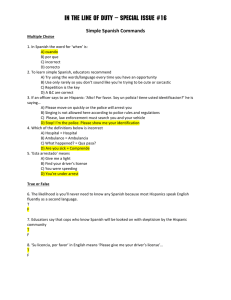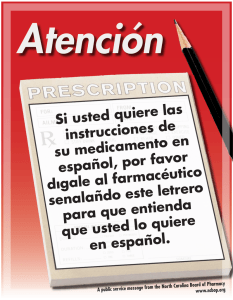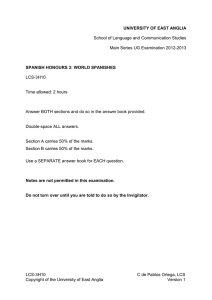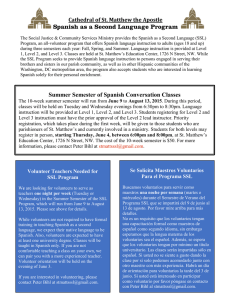Some helpful tips to help you to continue to acquire Spanish
Anuncio
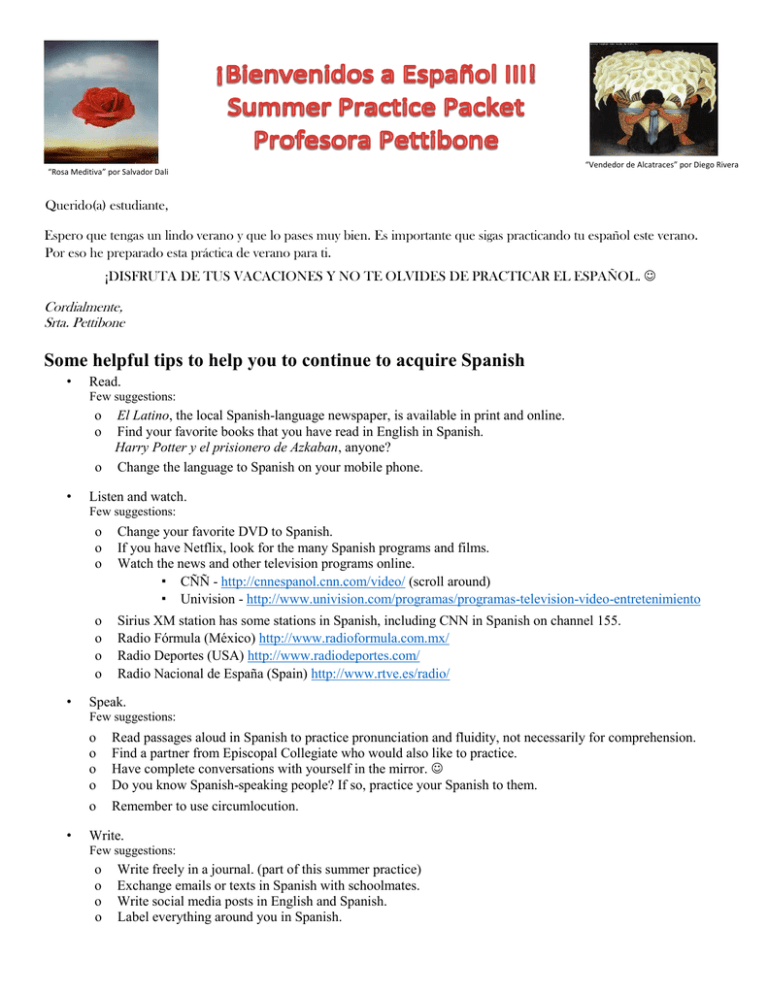
“Rosa Meditiva” por Salvador Dali “Vendedor de Alcatraces” por Diego Rivera Querido(a) estudiante, Espero que tengas un lindo verano y que lo pases muy bien. Es importante que sigas practicando tu español este verano. Por eso he preparado esta práctica de verano para ti. ¡DISFRUTA DE TUS VACACIONES Y NO TE OLVIDES DE PRACTICAR EL ESPAÑOL. Cordialmente, Srta. Pettibone Some helpful tips to help you to continue to acquire Spanish • Read. Few suggestions: o o El Latino, the local Spanish-language newspaper, is available in print and online. Find your favorite books that you have read in English in Spanish. Harry Potter y el prisionero de Azkaban, anyone? o Change the language to Spanish on your mobile phone. • Listen and watch. Few suggestions: • o o o Change your favorite DVD to Spanish. If you have Netflix, look for the many Spanish programs and films. Watch the news and other television programs online. ▪ CÑÑ - http://cnnespanol.cnn.com/video/ (scroll around) ▪ Univision - http://www.univision.com/programas/programas-television-video-entretenimiento o o o o Sirius XM station has some stations in Spanish, including CNN in Spanish on channel 155. Radio Fórmula (México) http://www.radioformula.com.mx/ Radio Deportes (USA) http://www.radiodeportes.com/ Radio Nacional de España (Spain) http://www.rtve.es/radio/ Speak. Few suggestions: • o o o o Read passages aloud in Spanish to practice pronunciation and fluidity, not necessarily for comprehension. Find a partner from Episcopal Collegiate who would also like to practice. Have complete conversations with yourself in the mirror. Do you know Spanish-speaking people? If so, practice your Spanish to them. o Remember to use circumlocution. Write. Few suggestions: o o o o Write freely in a journal. (part of this summer practice) Exchange emails or texts in Spanish with schoolmates. Write social media posts in English and Spanish. Label everything around you in Spanish. A few additional tips… • Do not worry about making mistakes when producing the language; that is part of the process. • Use your imagination; visuals help you to remember. • Repetition, repetition, repetition. It takes around 75 repetitions to commit information to your long-term memory. • Use www.wordreference.com if you need to occasionally look up a words. (No online translators, por favor.) • Have fun becoming more proficient in Spanish! “Monalisa” por Fernando Botero “Autorretrato, el tiempo vuela” por Frida Kahlo Practice assignment details (40 points) I. EL REPASO DEL VOCABULARIO Y LA GRAMÁTICA DE ESPAÑOL II Please review the vocabulary, grammar structures, and cultural notes of Spanish II. To access the Realidades textbook companion site for level two for review, copy and paste this website into your browser: http://phschool.com/webcodes10/index.cfm?wcprefix=jdk&wcsuffix=0001&area=view There you will have access to a plethora of helpful resources such as audio files of all of the vocabulary words, vocabulary exercises, grammar practice, etc. from Spanish II. II. TU DIARIO – YOUR JOURNAL Deberías escribir por lo menos ocho entradas en total. Escribe sobre lo que prefieras – actividades cotidianas, pensamientos personales, películas que miras, las noticias, et cetera. Lo que escribes será tratado como confidencial. Trata de usar tantos tiempos verbales y tanto vocabulario variado como sean posibles. O puedes escribirlo a máquina (type) o a mano legiblemente. (English: You should write at least a total of eight entries. Write about whatever you prefer – daily activities, personal thoughts, movies you watch, the news, etc. What you write will be kept confidential. Try to use as many verb tenses and as much varied vocabulary as possible. Type it or write it legibly.) Focus on what you know how to say. Do not worry about being perfect. Effort + completion = full credit In addition to your day-to-day activities that you include in your journal, consider watching movies and television and reading and watching news programs in Spanish, then write about them as journal entries. (See helpful tips above for a few resources.) Grammar structures to include in your journal writings: • El presente • El presente progresivo (Ej: Ahora estoy escuchando la música de Gypsy Kings.) • El pretérito (Ej: Ayer mis amigos y yo fuimos al cine y vimos dos películas.) • El imperfecto (Ej: Yo jugaba al fútbol cuando me caí. Me dolía la rodilla.) • El presente perfecto (Ej: Mi familia nunca ha viajado a México.) • Las comparaciones (Ej: Me gusta el invierno más que el verano.) You will turn in your writing journal the first day of class. I look forward to reading it! (Note: The “journal” does not have to be an actual journal book; it can be an electronic journal (Word doc.), in a spiral notebook, et cetera.) “La Catrina” por José Guadalupe Posada IF YOU HAVE ANY QUESTIONS, EMAIL PROFESORA PETTIBONE AT ANY TIME THIS SUMMER. [email protected]
